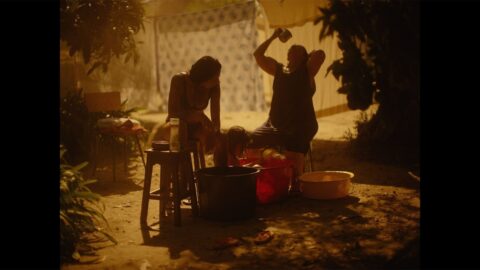João Nuno Pinto’s third feature, Competition entry 18 Holes to Paradise (2025), starts with an image you can’t shake.
Francisca (Margarida Marinho) is driving the backroads of southern Portugal, towards the family ranch their parents left behind, when a duck slams into her windshield. The glass shatters inward, the bird’s head and beak poking through — a sudden, brutal reminder that nature doesn’t wait for anyone. That collision sets the tone for the whole film: a family drama that keeps getting interrupted by the world outside.
She’s heading to meet her sister Catarina (Beatriz Batarda), her brother Lourenço (Jorge Andrade) and their kids. The plan is no sentimental reunion; it’s to decide whether to keep or sell the house. Francisca wants to hold on; the other two want to cash out; meanwhile, a wildfire moves in from the hills. As the smoke thickens, their arguments start to sound ridiculous. The house they’re bickering over might burn down before anyone signs anything.
The film is full of smart and subtle surprises, not just in terms of plot, but also in its structure and who the story is really about. This tale of three siblings could easily be split into three neat sections, but Pinto refuses that, focusing on the perspectives of three women, one of whom is not a member of the family. He mostly pushes the obnoxious, heartless Lourenço to the side and hands the real weight to Susana (Rita Cabaço), the daughter of the family’s longtime housekeeper, who’s now drifting into dementia. Susana has come back to make sure her mother isn’t screwed over one last time. To her, the house represents decades of unfair wages without a real safety net.
Pinto also plays with time in a way that throws you at first. By the end of the opening act — Francisca’s stretch — the fire feels minutes away: smoke everywhere, orange light, ash drifting across the lens. Then the film cuts to bright morning, clear sky, the house still standing. It’s safe to take another dip in the pool. It takes a second to realise we’ve gone backwards and switched to Catarina’s point of view. The fire is still coming; we’re just watching it approach again, from a different angle, trapped in purgatory with these people a little longer.
Holding all this together — a big cast, shifting perspectives, looming disaster — without losing control is impressive. The score by Ginevra Nervi never lets us relax, with tight, restless percussion that keeps ratcheting up, like the film itself is getting nervous on behalf of its characters.
This is a film that brushes up against a range of urgent issues — exploitative labour arrangements, environmental collapse, inherited privilege, the violence of capitalism — without ever slipping into lecture mode. Pinto lets these pressures emerge naturally through the way the family talks around their past and the fragments of history that surface in their arguments. Even the sly, ironic title points outward: land across the Iberian peninsula being carved into golf courses for the wealthy, kept impossibly green despite worsening drought. How do you maintain acres of manicured “paradise” when there’s barely enough water left to drink?
18 Holes to Paradise echoes other films — an early pool scene that brings Lucrecia Martel’s La Ciénaga (2001) to mind, or the recent Balearic (Ion De Sosa, 2025), another movie about privileged people swimming while the hills burn. Yet Pinto’s film is sharper, more contained, angrier in a quieter way. Underneath the surface calm, there’s a steady fury at waste, at blindness, and especially at the refusal to see who actually keeps these places running. It ends with a question it never quite answers out loud: when the smoke finally clears, what’s going to be left?
Editor-at-large Jared loves movies and lives with Kiki in Berlin.




